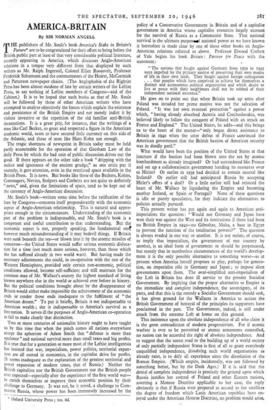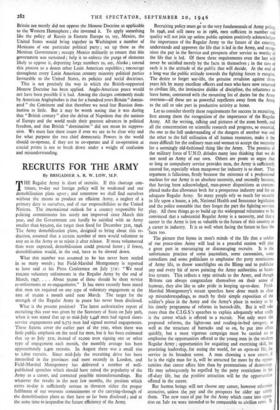AMERICA-BRITAIN
By SIR NORMAN ANGELL
THEpublishers of Mr. Soule's book America's Stake in Britain's Future* are to be congratulated for their effort to bring before the British public part at least of that very considerable political literature, recently appearing in America, which discusses Anglo-American relations in a temper very different from that displayed by such writers as Mr. Ralph Ingersoll, Colonel Elliot Roosevelt, Professor Frederick Schumann and the commentators of the Hearst, McCormick and Patterson newspaper chains. (The Anglophobia of the Rightist Press has been almost outdone of late by certain writers of the Leftist Press, to say nothing of Leftist members of Congress—and of the Cabinet.) It is to be hoped that such books as that of Mr. Soule will be followed by those of other American writers who have attempted to analyse objectively the forces which explain the existence and persistence of the British Empire and not merely indict it by violent invective or the repetition of the old familiar anti-British incantations. It is a great pity, for instance, that the writings of a man like Carl Becker, so great and respected a figure in the American academic world, seem to have secured little currency on this side of the Atlantic, and those of men like Hans Kohn not enough.
The tragic shortness of newsprint in Britain today must be held partly accountable for the operation of that Gresham Law of the daily Press by which the bad coin of public discussion drives out the good. If there appears on the other side a book "dripping with the malice and ignorance of the ancient grudge," as one critic put it recently, it gets attention, even in the restricted space available in the British Press. It is news. But books like those of the Beckers, Kohns, Commagers, Nevins, Stolpers and Corbetts are not quite so definitely " news," and, given the limitations of space, tend to be kept out of the currency of Anglo-American discussion.
Mr. Soule's book—written some time before the ratification of the loan by Congress—concerns itself preponderantly with the economic aspect of Anglo-American relationship. This is natural and appro- priate enough in the circumstances. Understanding of the economic part of the problem is indispensable, and Mr. Soule's book is a competent and useful contribution to that understanding. But the economic aspect is not, properly speaking, the fundamental one however much misunderstanding of it may bedevil things. If Britain were sunk beneath the sea—or blown into it by the atomic missiles of tomorrow—the United States would suffer serious economic disloca- tion for a time (not much more serious, however, than those which she has suffered already in two world wars). But having made the necessary adjustments she could, in co-operation with the rest of the Western Hemisphere, provided only certain non-economic, political conditions allowed, become self-sufficient and still maintain for the common man of Mr. Wallace's oratory the highest standard of living known anywhere else in the world or achieved ever before in history. But the political conditions brought about by the disappearance of Britain would either make impossible the achievement of the economic ends or render those ends inadequate to the fulfilment of " the American dream." To put it briefly, Britain is not indispensable to American wealth ; she is indispensable to America's survival as a free nation. It serves ill the purposes of Anglo-American co-operation to fail to make clearly that distinction.
Two or more centuries of nationalist history ought to have taught us by this time that when the pinch comes all nations everywhere accept the aphorism of Adam Smith that "defence is more than opulence " and national survival more than small taxes and big profits. It is true that for a generation or more most of the Leftist intelligentsia has insisted that war, imperialism, power politics, territorial expan- sion are all rooted in economics, 'in the capitalist drive for profits. (It seems inadequate as the explanation of the greatest territorial and power expansion of modem times, that of Russia.) Neither the- British capitalists nor the British Government nor the British people ever expected—especially after the experience of the first world war— to enrich themselves or improve their economic position by their challenge to Germany. It was noi, be it noted, a challenge to Com- munist Russia, whose power has been immensely increased by the * Oxford University Press ; 1os. 6d. policy of a Conservative Government in Britain and of a capitalist government in America whose capitalist resources largely account for the survival of Russia as a Communist State. That national survival is the ultimate purpossof national power as we have known it heretofore is made clear by one of those other books on Anglo-
American relations referred to above. Professor Elwood Corbett of Yale begins his book Britain: Partner for Peace with the
statement: •
" The nations that fought against Germany from 1939 to 1945 were impelled by the primary motive of preserving their own modes of life in their own lands. They fought against foreign subjugation . . . that peoples which have contrived to achieve for themselves a distinct and autonomous political organisation and which desire to live at peace with their neighbours shall not be robbed of their independent national existence."
He goes on to point out that when Britain took up arms after Poland was invaded her prime motive was not the salvation of Poland. " It was her own eventual protection " against a power
which, " having already absorbed Austria and Czechoslovakia, was
believed likely to follow the conquest of Poland with an attack on France and England." The United States, he adds—and this brings us to-the heart of the matter—" only began direct assistance to
Britain in 1940 when the utter defeat of France convinced the American government that the British bastion of American security was in deadly peril."
What would have been the position of the United States at that juncture if the bastion had been blown into the sea by atomic bombardment as already imagined? Or had surrendered like France and set up a collaborationist government handing its resources over to Hitler? Or earlier in 1939 had decided to remain neutral like Ireland? Or earlier still had anticipated Russia by accepting Hitler's offers of a deal? Or a little earlier still had rejoiced the heart of Mr. Wallace by liquidating the Empire and becoming another Ireland, or Spain or Portugal? None of these questions is idle or purely speculative, for they indicate the alternatives to policies actually pursued.
This present writer has put again and again to American anti- imperialists the question: " Would not Germany and Japan have won their war against the West and its institutions if there had been no British Empire in 1940—no Gibraltar, Malta, a base in Egypt to prevent the junction of the totalitarian powers?" The question is always evaded in one way or another. It is not meant, of course, to imply that imperialism, the government of one country by another, is an ideal form of government or should be perpetuated, but merely that in numberless circumstances of the world's develop- ment it is the only possible alternative to something worse—as at present when America herself proposes to play, perhaps for genera- tion, an imperialist role in Germany and Japan ; to impose alien governments upon them. The over-simplified anti-imperialism of the Left in Britain has done ill service to the present Socialist Government. By implying that the proper alternative to Empire is the immediate and complete independence, the sovereignty, of its parts, and that this is the remedy a Socialist Government should seek, it has given ground for the Wallaces in America to accuse the British Government of betrayal of the principles its supporters have proclaimed in the past. The Government, indeed, is still under attack from the extreme Left at home on this ground.
This insistence upon the absolute independence of all who claim it is the great contradiction of modern progressivism. For if atomic warfare is ever to be prevented or atomic armaments controlled, no nation can be accorded the right of absolute independence. And to suggest that the surest road to the building up of a world society of only partially independent States is first of all to grant everybody unqualified independence, dissolving such world organisations as already exist, is to defy all experience since the dissolution of the Roman Empire. (Which empire, incidentally, was not followed by something better, but by the Dark Ages.) If it is said that the denial of complete independence is precisely the ground upon which Russia justifies her control of Poland and other Eastern nations, asserting a Monroe Doctrine applicable to her case, the reply obviously is that if Russia were prepared to accord to her satellites the degree of freedom which Latin American republics have en- joyed under the American Monroe Doctrine, no problem would arise, Britain not merely did not oppose the Monroe Doctrine as applicable to the Western Hemisphere ; she invented it. To apply something like the policy of Russia in F.astern Europe to, say, Mexico, the United States would bring together in Washington a number of Mexicans of one particular political party ; set up these as the Mexican Government ; occupy Mexico militarily to ensure that this government was sustained ; help it to enforce the purge of elements likely to oppose it, deporting large numbers to, say, Alaska ; extend this process to a dozen other Latin American republics ; encourage throughout every Latin American country minority political parties favourable to the United States, its policies and social doctrines.
This is not precisely the way in which the British-supported Monroe Doctrine has been applied. Anglo-American peace would not have been possible if it had. Among the charges commonly made by American Anglophobes is that for a hundred years Britain " domin- ated " the Continent and that therefore we need fear Russian dom- ination as little. But it may be worth noting that it was during that "British century" after the defeat of Napoleon that the nations of Europe and the world made their greatest advances in political freedom, and that British " domination " did not mean its suppres- sion. We must face these issues if ever we are to be clear why and for what purpose the two chief democratic Powers in the world should co-operate, if they are to co-operate and if co-operation at crucial points is not to break down under a weight of confusion and misunderstanding.



























 Previous page
Previous page